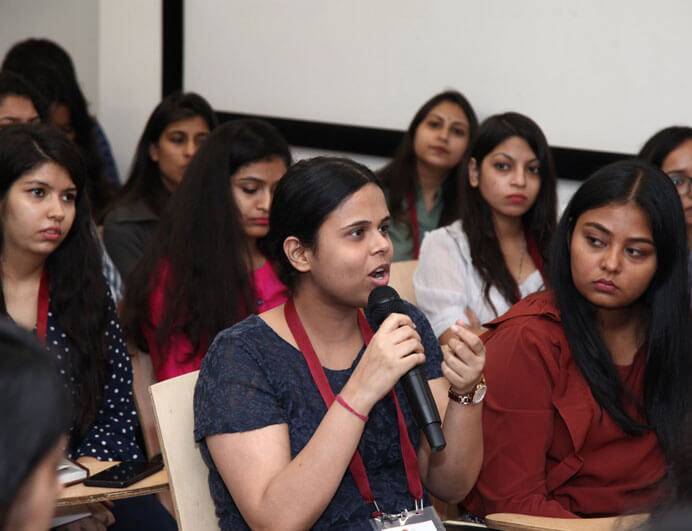Why I chose Vedica over the IIMs
Vidushi Bhalla tells us why she chose Vedica over traditional MBA programmes and the nurturing, inspiring space created by the women-only community.
A Business Economics graduate, Vidushi Bhalla had begun charting her corporate career path through stints with names like KPMG and AT Kearney. However, after spending close to four years in a top consulting firm and then in a pure management consulting role, she felt it was time for self-reflection on her career. “I was sure that for an accelerated career path, I would need to enrol for a management programme that would cater to my holistic development,” she says. A 97 percentile score in CAT meant she could pick from the top B-Schools in the country, including some of the new IIMs. Vidushi had also secured admission to Melbourne Business School. But she wanted to look beyond what she calls the “cookie-cutter” MBA programmes. A tip from fellow Gargi college alum got her attention to Vedica. The rest is her-story. Vidushi talks about her decision to transition from the boardroom to the classroom, the merits of being a part of a women-only community, its Shadow Mentor programme, and the inspiration all around her at Vedica.
You started your career in consulting and also gained substantial experience with big industry names. You gave up that job security for your MBA. Is it an easy trade-off?
I chose consulting as a profession at the beginning of my career because I wanted to get insights into how different industries work. But I knew that future growth would be difficult without a postgraduate programme, especially in today’s times when things are changing rapidly. Everything is going digital, and there is an increased focus on sustainability. Your work experience helps you appreciate where business comes from when you are back in the classroom. You have lived and breathed those experiences and can relate to them when you learn about various concepts during your MBA. So I’d say if you have work experience and want to pursue your MBA, it is best not to delay that decision.
You had secured admission at a few other programmes but you opted for Vedica. What were you looking for from your MBA and what were the factors that helped make your decision?
I definitely didn’t want to be a part of the traditional B-School rat race. I was looking for guidance as well as network. The experience of working with a woman on board doesn’t happen very often. Even when I was in the corporate world and say a woman made it to the partner level, it would be celebrated, but it was a rare sight. So when I learnt about Vedica from an alum, who was my junior at Gargi College, the first thing that appealed to me was the Shadow module. The opportunity to work with some of the most influential women leaders for four to six weeks of a full-fledged summer internship programme is something I just couldn’t miss.
Was the prospect of mentorship the primary reason you opted for Vedica then?
I have been working in the industry for enough time to understand the importance of mentorship--having someone to guide you at the right time for a change in your career. The hands-on mentoring by women leaders at Vedica is very different from other B-Schools. These women leaders are at the top of their careers and you see them as role models in life and your career. Then Vedica also provides you with the male mentors, who bring their perspective to the learning experience. And of course, there is the impressive faculty. I believe in pursuing education for the experience and not the outcome. I can say, I have been completely satisfied with the experience.
Vedica remains a women-only community. Do you see any intrinsic benefits harnessed by this unique feature of the programme?
I believe that an all-women space nurtures and gives women the space to pursue their traits in leadership or organisation or other management styles that may be termed as masculine in a contemporary world. There were no gendered tasks or differences that we would see around us. I think that’s very healthy, that’s something that needs to be encouraged in women. There are leadership qualities and there are certain tasks that are in management and they’re just that. They don’t need to be gendered.
Finally, what do you make of the curriculum, which also includes liberal arts?
Since I am from a core Economics background, I have never really experienced Liberal Arts. Now that my focus is also on my personal growth, I greatly appreciate the importance of liberal arts, theatre and expression, and interactions with people. It does offer context to business, as I have learnt through experience and can now relate some of these experiences to Marketing. I love the fact that there are four interdisciplinary courses. So, on one hand, I am learning about leadership, innovation and building through potential, and then there is a class on Communication. I think there is always a scope for improvement in communication. Vedica doesn’t underestimate anything and gives due credit to aspects that you might need in the beginning, mid or later stages of your career. There is so much to learn and I am really excited to see what comes next.




